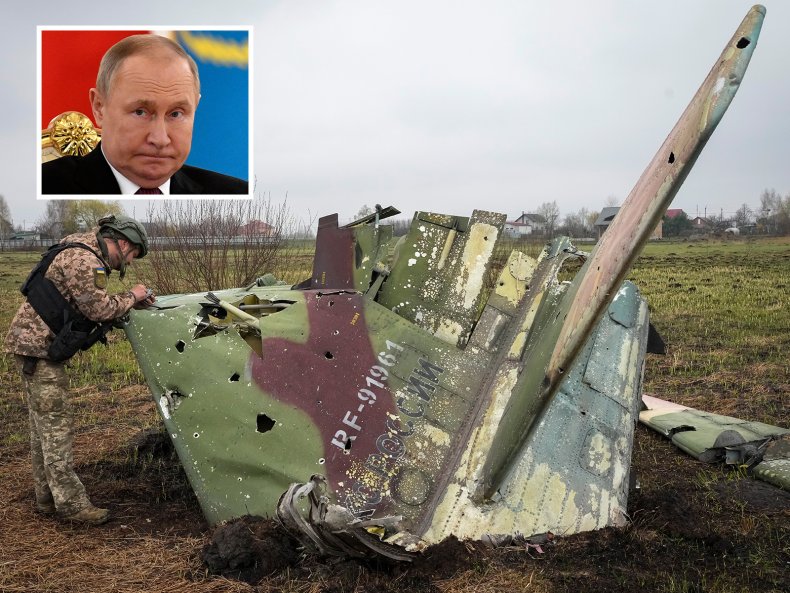RUSSIA IS GIVING A MASTER CLASS ON HOW NOT TO FIGHT A WAR
 Vladimir Putin’s war in Ukraine will be studied for centuries by military historians — as a master class in how not to fight. His latest tactic — bombing Ukrainian cities — is yet another desperate and despicable gambit that is likely to backfire.
Vladimir Putin’s war in Ukraine will be studied for centuries by military historians — as a master class in how not to fight. His latest tactic — bombing Ukrainian cities — is yet another desperate and despicable gambit that is likely to backfire.
By mid-April, Putin had abandoned his ill-fated assault on Kyiv and concentrated his forces in the east. This was the one time when anything went right for the Russians: They managed to use their advantage in artillery to slowly push the Ukrainians out of Luhansk province by early July.
But then the Ukrainians started receiving the U.S. High Mobility Artillery Rocket System (HIMARS) and everything changed. The Ukrainians were able to stop the relentless rain of Russian shells by targeting ammunition dumps and command posts. The Russians never adjusted; there is no indication they have taken out a single HIMARS.
In early September, the Russians made another major blunder: Having shifted forces from the east to defend against a Ukrainian counteroffensive in the south, they were caught unprepared when the Ukrainians launched a surprise attack around Kharkiv. The Ukrainian army liberated thousands of square miles of territory and sent Russian forces reeling.
In desperation, Putin ordered a “partial mobilization” of military manpower on Sept. 21. It has been another fiasco: In all likelihood, more Russian men have fled the country (at least 300,000) than joined the army. The government has been reduced to sending police and soldiers to hunt down potential recruits as if they were an 18th-century press gang.
Little wonder that so few Russians want to serve: The zinc coffins are already coming home with bodies of untrained conscripts rushed to the front lines to face the battle-tested Ukrainians. Russian draftees might as well report straight to the morgue. As with the Soviet war in Afghanistan, the drip-drip of casualties will likely further undermine support for the “special military operation” — and the dictator who ordered it.
Putin continues to blunder on. On Sept. 30, he announced the annexation of four Ukrainian provinces that his forces do not fully control and threw out threats of nuclear war if the West does not let him get away with it. That hasn’t stopped the Ukrainian offensive or Western support for it.
On Oct. 10, following an explosion that heavily damaged the bridge linking Crimea with the Russian mainland, Putin began using missiles and drones to attack Ukrainian cities. On Monday, a swarm of Iranian-made kamikaze drones hit Kyiv.
This recalls Iraqi strongman Saddam Hussein’s “War of the Cities” against Iran beginning in 1984. Having launched a war of aggression that went badly for him (sound familiar?), Hussein turned to bombing cities in the hopes of breaking Iran’s will to fight. But the “War of the Cities” failed; it simply led to Iranian retaliation in kind. So, too, the German bombing of London in 1940-1941, and in 1944-1945 with V-1 and V-2 rockets, only hastened Hitler’s downfall.
There is, in fact, virtually no evidence from the past 100 years that terror bombing has been a war-winning tactic. The usual result is to unite the population in defiance of the attackers. Even in World War II, when Allied bombers dropped millions of tons of bombs on Germany and Japan, winning the war still required defeating Axis armies.
Unless Putin uses nuclear weapons, there will be sharp limits on how much destruction he can inflict, because Ukrainian air defenses remain operational and are being beefed up with Western systems such as the German IRIS-T. The new Russian commander in Ukraine will soon discover that this isn’t as easy as bombing helpless Syrian rebels.
If Putin grows truly desperate, he might resort to tactical nuclear weapons, but this is a high-risk option that could backfire if it results in a NATO military response.
Unfortunately, despite all of the setbacks that Russia has suffered, there is no indication that Putin is willing to pull back. No doubt he is still hoping that resistance will crumble over the winter. In an attempt to ratchet up the pressure, he is targeting electrical infrastructure in Ukraine and interrupting Russia’s natural gas sales to Europe.
But eight months into the war, there has been no sign of faltering in either Ukraine or the West. The combination of Russian barbarism and Ukrainian military success is keeping the anti-Putin coalition united. The Ukrainian military has shown itself to be far more capable and nimble than the lumbering Russian military, and that won’t change no matter how many conscripts the Kremlin sends to an early grave.
No one can say for sure how this war will end — but with each passing day, it looks more likely that Putin won’t be happy with the outcome.
Max Boot is a historian, best-selling author and foreign-policy analyst who has been called one of the “world’s leading authorities on armed conflict” by the International Institute for Strategic Studies. He is the Jeane J. Kirkpatrick senior fellow for national security studies at the Council on Foreign Relations.

